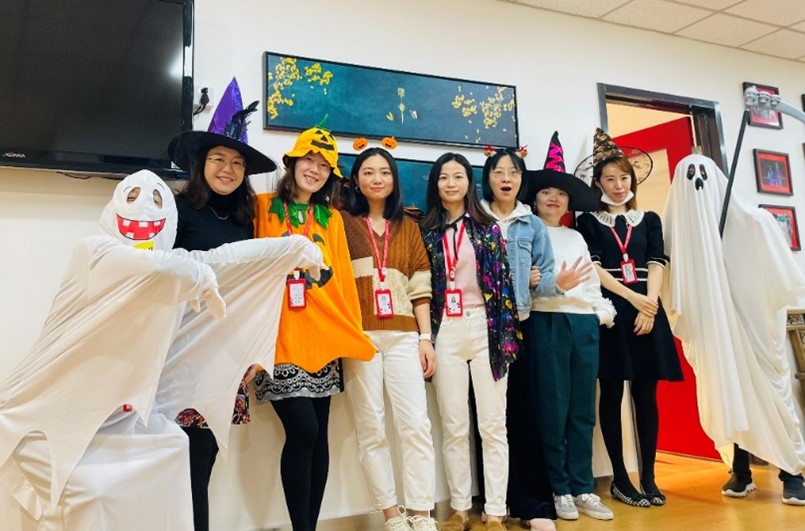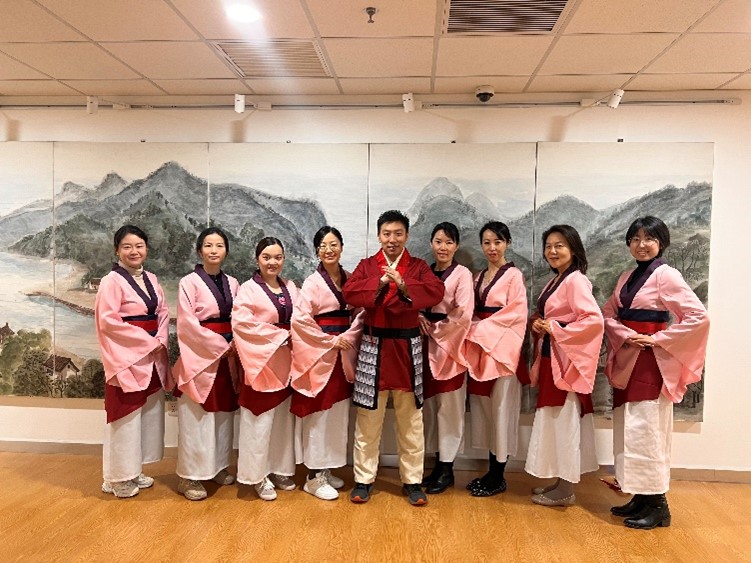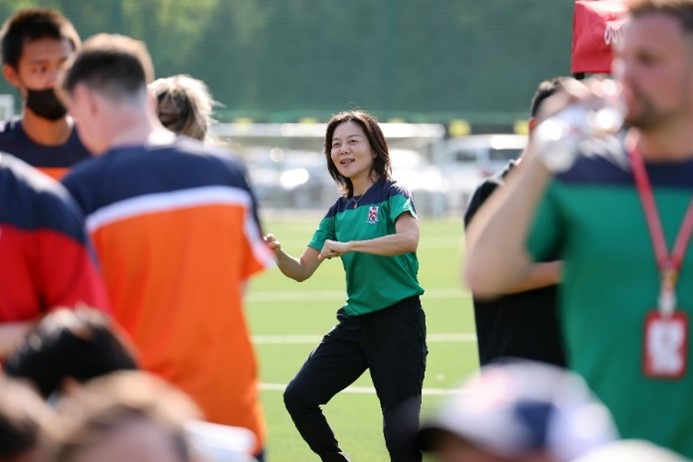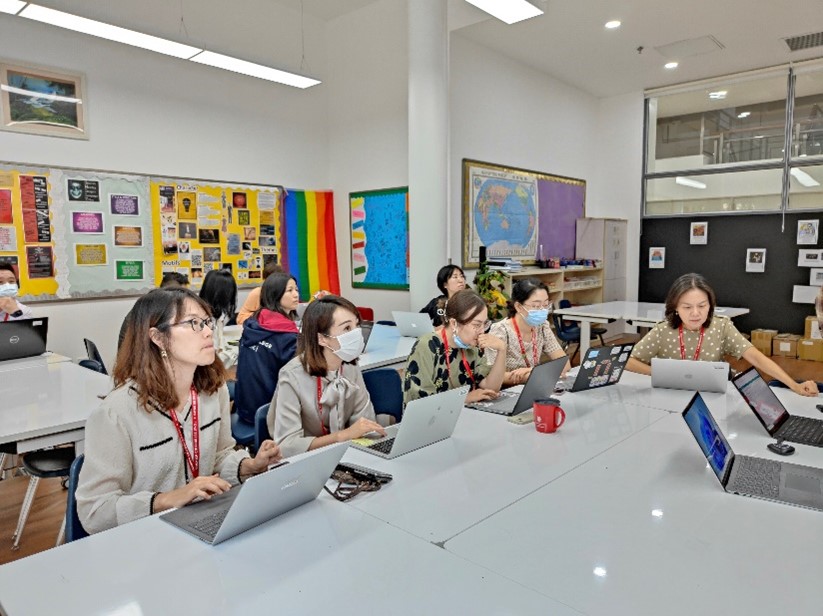Embedding Holistic Education in Chinese Language Learning Senior School Chinese
Mandarin has been an integral part of the Dulwich College International curriculum ever since it opened its first school in Shanghai in 2003.
And at Dulwich College Beijing, Mandarin is more than just a subject. With a student body hailing from different cultural backgrounds, our Mandarin curriculum is in line with our international motto, Detur Pons Mundo – or building bridges to the world – and is more than just about academic achievement. Understanding Chinese linguistically and culturally helps have a deeper understanding of the local culture alongside their international upbringing, which will prepare them for this increasingly globalised world and hopefully become the best version of themselves.
For our Senior School, taking up this challenge is our caring, passionate and highly qualified Senior School Chinese teaching team of 9, who bring with them a wealth of experience both internationally and locally, including teaching IB and IGCSE Chinese. They guide our students on a bespoke language journey through curriculum mapping and by forming positive relationships with our students to understand their needs better. Embedding DCB's holistic education into the curriculum, they use various topics and inquiry-based learning approaches to guide students onto a well-prepared learning journey from the lower year groups to IB.

We partnered with the student-led Dulwich Dudes Podcast Senior School team and spoke to long-time DCB staff and Head of Senior School Chinese Lu Chen to learn more about DCB’s Chinese curriculum and offerings, her experiences teaching at DCB some advice for Senior School families learning Chinese, and events to look forward to in the coming months!

Lu Chen
Head of Senior School Chinese
AMC: Chinese learning in international schools cultivates students' interests while supporting them with in-depth learning that leads to professional levels. How do you and your team teach Chinese differently to achieve these goals?
First, we assess the students’ language proficiency and place them into their respective classes. In Key Stage 3, Chinese teaching in the native-Chinese speaking level class emphasises on literary forms including scenery writing, expositions, narrative prose, novel excerpts, argumentative essays, ancient poems, etc. We aim for the students to boost their feel for the language and grasp how articles are structured in Chinese literature. Meanwhile, students who study Chinese as a second or foreign language focus on subjects about life skills and culture. We aim to cultivate students' practical communication skills and understanding of Chinese culture.
But unlike traditional Chinese classes elsewhere, Chinese learning in DCB Senior School aligns with DCB's vision and mission and is taught through the lens of global citizenship. To prepare our students for an unpredictable future with unknown technology, we teachers can no longer just pass on our knowledge. So our Chinese classes also help students build learning skills including research, critical thinking, communication, social, and time management skills.
Our teachers introduce and cultivate these critical and transferrable skills in Chinese lessons through various learning activities for students in different year groups. We follow an inquiry-based learning approach to equip our students with the tools to become lifelong learners.
AMC: How does DCB support students who want to learn Chinese for higher education?
We teach the IB curriculum, which is usually the ultimate learning goal within the Senior School years. Like DCB's well-planned curriculum mapping from young ages, students who want to take on IB Chinese started their journey as early as Key Stage 3. During the later IGCSE years, the learning is even more specifically planned.
For example, native-level Chinese speakers who will take up IB Chinese are required to study ancient poetry and prose. So during the IGCSE stage, we learn how to examine ancient prose from the Ming Dynasty. To be able to do that, we study ancient poetry and prose in Year 7. Students build up their knowledge of ancient Chinese by learning words used differently in ancient times, causative usage, and interchangeable characters, making it possible for a higher level of Chinese learning in later years.
Another example: IB requires native Chinese-speaking students to write textual analysis essays. So, in the IGCSE stage, 25% of our writing practice are argumentative essays demonstrating viewpoints. Therefore, from Year 9, we have an entire teaching unit introducing logical arguments. Our curriculum is planned for students to express their literary views in a structured framework.
DCB Senior School Chinese department has a very stable team with several long-term staff. We also try to get IB teachers to teach IGCSE and Key Stage 3. The curriculum is structured differently but with interconnected goals across the year groups. Students and teachers forming a positive relationship early on helps implement the students’ growth path in meaningful ways.
AMC: Extensive reading is an integral part of language learning. For students who would like to invest more time in reading, what do you recommend?
We have integrated reading into everyday learning in the curriculum. Throughout Key Stage 3, each school year has a unit of whole book reading. Reading materials are also introduced in the other three units. Teachers guide students to read in various approaches and assess them in different ways. For students who study Chinese as a second language, teachers will choose level-approriate reading materials through two platforms: Chairman's Bao and iChineseReader.
Naturally, study within the classroom is limited, and the amount of reading associated directly with the curriculum is far from extensive reading. If students are willing to read more, and parents are willing to spend time reading with their children, they can also refer to more diversified reading lists. Native-speaking students may refer to the reading list from local schools.
AMC: What are some ECAs (extracurricular activities) that could be of interested to our Chinese learners?
We have a long list of ECAs, such as:
- The Chinese newspaper Xue Tong She(学通社), where students write film reviews, book reviews, creative writing pieces, news and interviews, etc.
- The student-led Chinese Culture Club ECA, where students teach other students different elements of Chinese cultural inheritance such as making mooncakes, writing antithetical couplets (dui lian 对联), studying Hanfu clothing from the Han Dynasty, etc.
- The Chinese Film Club, where students learn about Chinese culture and filming skills by appreciating Chinese films. Last year, the club made short films that received positive reviews from their peers and from film industry professionals, inspiring some students to pursue their passion for filming.
- The Debate Club. Recently, our students participated in a debate competition amongst international schools. Although our representatives did not make it to the finals due to the pandemic, their confidence and innovation greatly impressed the judges.
Events such as our annual Chinese short film festival and the Spring Festival Gala also allowed students to be creative in Chinese. Student performances, including Chinese zither (gu zheng), Chinese singing, and traditional dances in Hanfu, were great learning opportunities and were a lot of fun.

DDP: What are some of the major events we can expect this year?
On January 19, we’re holding the traditional Chinese Spring Festival gala together with the Chinese Short Film Festival, combining the two for the first time this year. We kicked off the short film festival in September based on the theme Dulwich values, and students started their production in October. I'm impressed how students showed incredible resilience by overcoming obstacles during online learning and finished their productions. I also look forward to the student performances during the gala. From the line-up of student productions, I can only imagine it is going to be incredible.
This March, we're participating in the International Schools' Chinese Poetry Competition. Last year, the topic was Spring, and three students won awards. I look forward to the students' achievements this year.
In addition to that, Chinese teachers across EiM (Education in Motion) schools are planning an interschool online essay writing competition. Joining the conference and reading fellow students' work will inspire our students.
I invite everyone to watch out for the upcoming Chinese events. I'm sure there will be many pleasant surprises.
DDP: Can you share some experiences or highlights during your career at DCB?
This is my 14th year in DCB, and there are a lot of great memories. First off, there’s the Yunnan Project.
I was very fortunate to be one of the teachers who went on the most trips to Yunnan with Ms Tomaszun. Students from DCB were away from their familiar environment and organised various activities to teach the local Junior School students – English, Math, Music, PE and Art. Our students may be young and don't do much housework at home, but in Yunnan, they repainted the classroom walls, played with the kindergarten children, and tried their best to make them happy. They also exercised with local junior school students while listening to music. When we left after three days of work and teaching, the local school students took our students' hands and didn't want to let us go for a long time. I read love in their eyes; that moment made it the number one highlight of my career.
Second is that, as a member of Wodehouse, I enjoy House events such as the annual tug of war and track and field. I like to see how the power of unity is shown in the details. I remember one of my sports shoes was torn apart in a tug-of-war. I cannot remember how it happened!

DDP: What are some challenges you had to face during your career at DCB?
DCB is a school with a high reputation. Working here requires high efficiency and great motivation. As teachers, going to work every day is like going to the battlefield.
For me, time management is crucial. Sometimes I get anxious, so I list things to do and prioritise by urgency and importance. Then, following the list one by one, I concentrate on tasks and complete them all thoroughly.
But do not stay up too late (不要熬夜). To teachers and students!
If I really cannot finish a task, I tell myself: the sky will not fall (天不会塌了) and then take a hot bath, listen to some music, have a good sleep and then do it again the next day.
We also need to remind ourselves to think positively and keep smiling.

AMC: What would you suggest for parents who want to support their children’s' Chinese learning?
Learning characters, phrases, and sentences is inseparable from Chinese learning. Parents who want to support children's Chinese learning can spend some time on the learning content each school year. Especially for younger children, helping students practice and master the basic vocabulary can greatly support their learning in later stages.
Many parents within the community wish their children could master both Chinese and English languages. Students' Chinese learning within the limited class hours and the international school environment may not live up to parents' high expectations. I recommend that parents converse Chinese with their children about popular social news. During teaching, we found that many students need a more practical sense of the society they live in, which provides critical contextual value when learning the language. By discussing news and popular social topics, students get to build their social awareness and exercise their language skills.
Students can use their break time to listen to interviews in Chinese literature and history. Official accounts such as Ximalaya, Youshu, and Baijia Jiangtan provide good Chinese learning resources.








